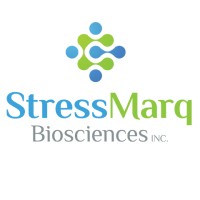Kv7.4 Monoclonal / PerCP / N43/6
Product Details
| Description | Mouse Anti-Human KCNQ4 Monoclonal IgG1 | |
|---|---|---|
| Conjugate | PerCP | |
| Clone | N43/6 | |
| Target Species | Human, Mouse, Rat | |
| Applications | ICC, IF, WB, IP, IHC, Microarray | |
| Supplier | Stressmarq | |
| Catalog # | Sign in to view product details, citations, and spectra | |
| Size | ||
| Price | ||
| Antigen | ||
| Host | ||
| Isotype |
About Kv7.4
The protein encoded by this gene forms a potassium channel that is thought to play a critical role in the regulation of neuronal excitability, particularly in sensory cells of the cochlea. The current generated by this channel is inhibited by M1 muscarinic acetylcholine receptors and activated by retigabine, a novel anti-convulsant drug. The encoded protein can form a homomultimeric potassium channel or possibly a heteromultimeric channel in association with the protein encoded by the KCNQ3 gene. Defects in this gene are a cause of nonsyndromic sensorineural deafness type 2 (DFNA2), an autosomal dominant form of progressive hearing loss. Two transcript variants encoding different isoforms have been found for this gene. [provided by RefSeq, Jul 2008]
The protein encoded by this gene forms a potassium channel that is thought to play a critical role in the regulation of neuronal excitability, particularly in sensory cells of the cochlea. The current generated by this channel is inhibited by M1 muscarinic acetylcholine receptors and activated by retigabine, a novel anti-convulsant drug. The encoded protein can form a homomultimeric potassium channel or possibly a heteromultimeric channel in association with the protein encoded by the KCNQ3 gene. Defects in this gene are a cause of nonsyndromic sensorineural deafness type 2 (DFNA2), an autosomal dominant form of progressive hearing loss. Two transcript variants encoding different isoforms have been found for this gene. [provided by RefSeq, Jul 2008]
About PerCP
Peridinin-Chlorophyll-Protein (PerCP) is a red-emitting fluorescent protein isolated from algae that can be excited by the 488 nm blue laser and captured with a 670/30 nm bandpass filter. PerCP exhibits a large Stokes' Shift, with an excitation peak at 482 nm and an emission peak at 675 nm. PerCP is was historically used in flow cytometry, however it is highly susceptible to photobleaching and has poor stability. Alternatives like BB700, NovaFluor Blue 690 or PerCP-eFluor™ 710 are preferred. PerCP is a generic dye that has no sole manufacturer.
Peridinin-Chlorophyll-Protein (PerCP) is a red-emitting fluorescent protein isolated from algae that can be excited by the 488 nm blue laser and captured with a 670/30 nm bandpass filter. PerCP exhibits a large Stokes' Shift, with an excitation peak at 482 nm and an emission peak at 675 nm. PerCP is was historically used in flow cytometry, however it is highly susceptible to photobleaching and has poor stability. Alternatives like BB700, NovaFluor Blue 690 or PerCP-eFluor™ 710 are preferred. PerCP is a generic dye that has no sole manufacturer.
Experiment Design Tools
Panel Builders
Looking to design a Microscopy or Flow Cytometry experiment?
Validation References
Reviews & Ratings
| Reviews |
|---|
Looking for more options?
196 Kv7.4 antibodies from over 18 suppliers available with over 34 conjugates.





